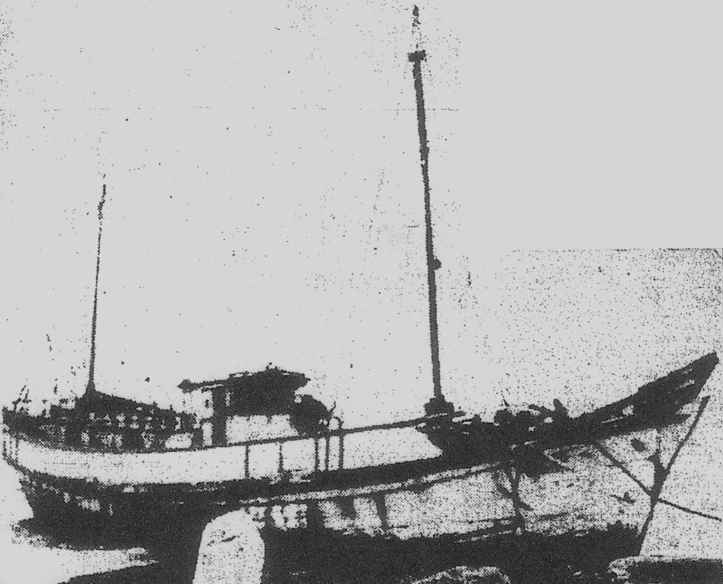
The Ryo Yei Maru, photograph from the Seattle Times, Nov. 1, 1927
RYO YEI MARU
John W. Sparrow
Sung by J. W. Sparrow
Recorded on "Dances With Words" - Squires Own Music
A Japanese fishing vessel was found adrift off Cape Flattery, Washington, in 1927. She had drifted for two years around the Humbolt and Japanese currents up to the arctic and back to the equator after her crew of 12 died of thirst and starvation. A diary was found on board that told the tale of the sufferings of these men. She was tied up in Seattle and became a focus of quite a lot of public curiosity. A traveling carnival offered a substantial sum of money to exhibit her, which was refused as an orgainzation of American fishermen took the initiative to return the remains found aboard her to their families in Japan and then to burn the tiny ship on the shore at Richmond Beach.
Nineteen hundred twenty-seven,
There are few who remember
The winds blew down the puget sound
On the whitecaps of November
Telling a tale of ship set sail
From a land beyond the blue
And of Capt. Miki's fishermen
On the Ryo Yei Maru
Eight miles away from the coastal shore
On a cold all hallow's eve
The freighter Margret Dollar's bound
For the cape of Flattery
When the gods of sea made their decree
That it's time the world knew
Of the fate of 12 poor fishermen
On the Ryo Yei Maru
Chorus: How we took her out on Richmond beach
And burned her to the ground
The black smoke rose up to the sky
And the white gulls wheeled around
(repeat)
What ship is this in the morning mist
What markings on her stern
The Captain and three sailers
Set out in a lifeboat to learn
As they draw nigh to the leeward side
They yet can see no crew
Amid the seaweed and the barnacle
On the Ryo Yei Maru
Captain, captain! comes the cry
From this unholy scene
The skeletons of sailing men
By salt and sun picked clean
Gathering the bones of ten lost souls
No sign of the other two
Such was the freight that rode that day
In the Ryo Yei Maru
Chorus
Tie her down at 41
In old Seattle town
They would need someone to read
The diary they had found
So they took the book
To the embassy
On Monroe Ave
Where they read the news of the terrible cruise
Of the Ryo Yei Maru
On Dec 5th we began this trip
From Misake Bay
Two barrells of water, one of sake
And rice for thirty days
Five days out and the engine's down
The shaft has broke clean through
So we ride to east on rising seas
In the Ryo Yei Maru
Chorus
The 23rd of December, 700 miles from home
The winds that moans above the waves
Is filled with ice and snow
It's too late to turn back now
There's nothing left to do
But to try to make America
In the Ryo Yei Maru
January, Feburary, we wander aimlessly
Push by the whim of tide and wind
On an ever changing sea
We drift on though the food is gone
Before the month of March is through
We watch as seven comrades die
On the Ryo Yei Maru
Chorus
The 10th of May the final day
He writes his family
He writes to say farewell
And to tell his son never go to sea
And he asks him to remember to his mother to be true
And to pray for his poor father's fate
On the Ryo Yie Maru
I was turned onto this story by a woman named Wilma Van Valkenburg. She was the widow of a man who was a fisherman in Seattle in the 1920s. I met her in a University Place long term care facility in the 1980s. Her husband had been involved in the final disposition of the Japanese ship and in returning the remains of its crew to their families. Mrs VanValkenburg remembers that several Japanese families came to see the ship burned at Richmond Beach. According to her recollection, they seemed to particularly impressed by a flock of white gulls or terns that seemed to congregate over the burning ship. She later said that some of the Japanese people explained to her husband that in the folklore of their country the souls of the dead were thought to be manifested in the appearance of certain birds such as cranes, and in the case of seamen in gulls and terns. J.W. Sparrow. See also Nina's Ghost Ship - JW Sparrow
Pacific Nothwest Folklore Society